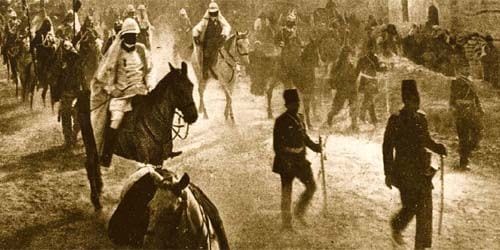
There have been countless histories of World War I and of these, most have concentrated on the practice of trench warfare, and have approached this from the perspective of the Entente Powers. Sean McMeekin’s book is refreshingly different in that it focuses on the often overlooked participation of the Ottoman Empire in the war, and centres on the Central Powers and their concerns and motivations.
The dominant figure here is Kaiser Wilhelm II, who is perhaps best remembered as the ruler who led his country into war in a display of solidarity with the Austro-Hungarian empire, and who became the bad guy figure most recognisable to the Entente after his invasion of Belgium. The spark that was the assassination of Archduke Franz Ferdinand has served to obscure the fact that the imperialism of all of Europe’s powers was also a major cause of the war. Kaiser Wilhelm II’s imperial ambitions were particularly far-reaching, and these are central to the narrative of The Berlin-Baghdad Express.
The Kaiser’s preoccupation with widening the borders of his territory meant that the alliance between Germany and the Ottoman Empire was crucial. Straddling Europe and Asia, the Ottoman Empire was Europe’s gateway to the East, and the Orient, considered more exotic yet less civilized than Europe, and was a prime target when empires were being expanded. The Kaiser’s ultimate destination was India, which was at this time under British rule. In the environment of war it would be easier to divest it from Britain, so in World War I the Kaiser found an opportunity to realise his ambitions.
However, to reach the East, Germany would have to have a suitable mode of access. The most direct route was over land, and the plan was to construct a railway that ran from Berlin, through Europe, Turkey and the Middle East, to Baghdad. The first leg was a simple enough matter, but crossing the vast expanse of present-day Turkey would be more difficult: this is why Germany’s alliance with the Ottoman Empire was so important. In order to secure the blessing of the Ottomans as they carried out this task, the Germans poured huge sums of money into the country.
However, Germany intended its alliance to be not only with the Ottoman Empire, but with the whole of Islam. This would secure them allies not only in the Ottoman state, but also in Arabia, Northern Africa and parts of British controlled India. The Kaiser’s idea was a jihad in which the Islamic world revolted against the colonial powers that ruled much of it. The twist in this plan was that the mujahideen would in fact remain under colonial rule, with the only real difference being that they would now be part of a German empire.
This is not really a book about the railway, which was in fact not completed until 1940, but the railway holds it together like a backbone and provides a narrative engine as powerful as any train. More interesting than the railway itself are the details that McMeekin provides about Germany’s key players in this front of the war, and their exploits in the Ottoman Empire. Central of these is Max von Oppenheim, a wealthy orientalist reminiscent of an Indiana Jones adversary. His knowledge of the region meant that he became head of the German Intelligence Bureau for the East.
The book’s other important figure is the Ottoman Sultan Abdul Hamid II, the Kaiser’s opposite number in the East. He was as interested in an alliance with Germany as the Kaiser was; having been rejected as an ally by the other European powers due to his country’s perceived backwardness, he sought a friendship that would bring him closer to Europe.
Ultimately, the proposed jihad was of course unsuccessful. The idea of holy war was not enough in itself to rally together the forces that Germany was counting on. Moreover, the Germans who were so in favour of jihad were technically infidels themselves, and it is hardly surprising that this resulted in some problems.
The Berlin Baghdad Express is a refreshing kind of military history that approaches World War I from a truly fresh angle. The Ottoman focus certainly makes this a singular and highly original book but, more significant is McMeekin’s interest in the workings of empire during the war. As he demonstrates here, the imperial concerns of all of the European powers played a bigger part in the war than is often acknowledged.
